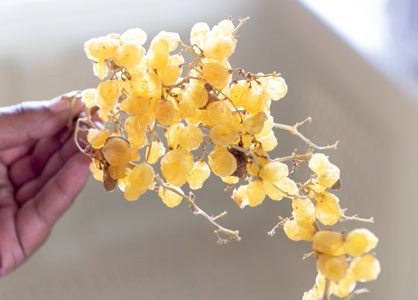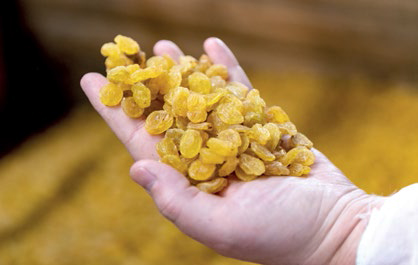Raisins South Africa, a non-for-profit organisation that represents over 1000 raisin farmers, reports a successful season regardless of abnormally heavy rainfall experienced in production areas.
The Orange River region, in the Northern Cape, where 88% of the country’s raisins are produced, experienced between 80mm – 170mm of rain at the beginning of last year. These conditions were exceptional for the Northern Cape, which usually experiences average temperatures of between 33-38 degrees C during harvest. Strategies were put in place at farm level to mitigate the impact of the rains on the crop, such as canopy management and constant monitoring of the situation.
Ferdie Botha, CEO of Raisins South Africa, comments: “From a grower perspective, climatic conditions for the past season did not provide for optimal growing conditions. Conditions were constrained in the Orange River valley initially by frost and cold weather conditions, which perhaps negatively impacted more than initially anticipated. Furthermore, the Orange River came into flood and restricted access to some growers, along with above average rainfall, and required changes in production practices to minimise the impact.”
The Olifants River valley in the Western Cape, however, experienced excellent growing conditions, particularly for currants.
 Another product that was also less impacted by the rains, was the ‘SA Sultana’, formerly known as the ‘WP raisin’. Raisins South Africa relaunched the variety in 2021 after the gradual increase in production volumes and as part of the diversification of their product range.
Another product that was also less impacted by the rains, was the ‘SA Sultana’, formerly known as the ‘WP raisin’. Raisins South Africa relaunched the variety in 2021 after the gradual increase in production volumes and as part of the diversification of their product range.
Raisins South Africa have now focused their attention on 2022 and are optimistic about the season ahead. The organisation launched a promotional campaign in the UK in 2019, which will continue to focus on evolving connections with B2B and trade contacts, as well as communicating the benefits of South African raisins to consumers. The export volumes of South African raisins to the UK were up once again vs 2020, which saw a huge increase compared to 2019. The UK imported 1,430,000 kg to the UK in 2019 vs 5,514,500 kg in 2020. 2021 saw an 18% increase vs 2020 with 6,626,996 kg exported to the UK.
South African raisin industry guided by sustainability
The organization announced that their strategic focus is guided by two main pillars of sustainability: good corporate governance and economic resilience. The organisation’s objectives adhere to the Triple Bottom Line (TBL) concept, an idea developed by John Elkington in 2001, which links sustainable development to commercial business. This concept goes beyond the objective to earn financial returns for shareholders, to further include social and environmental dimensions, generating a “triple bottom line”.
Ferdie Botha comments: “Raisins South Africa is part of the strong global drive for more agri-food industry practices that are environmentally friendly, socially acceptable, and still economically rewarding. “We are ensuring good corporate governance at industry association level to ensure sustainability becomes a driving factor in our research and development activities. We understand the process of decision making in economic, environmental and ethical spheres. We are committed to corporate ethics, accountability, participation, and holistic management when it comes to working in partnership with our raisin growers.”
 Raisins South Africa identifies soil health as key environmental strategy for the future
Raisins South Africa identifies soil health as key environmental strategy for the future
Raisins South Africa are working to provide direction on the environmental integrity dimension of sustainability to advance the industry’s sustainable performance levels for the future. The has announced the importance of soil health as part of a key consideration to the environmental sphere of sustainability.
At the start of 2021, Raisins South Africa organised a field day focussing on Healthy Soils for Healthy Vines. The workshop was attended by 120 raisin growers and 50 pupils from the agricultural department at High School Martin Oosthuizen over the course of two days. The workshop highlighted the importance of healthy soil properties through demonstrating how different soil preparation techniques can be applied to ensure optimum use of this natural resource. Stefan Jordaan, Raisins South Africa’s Agri-specialist, explains: “For any raisin grower, sustainable production over the long term is crucial, therefore soil health is at the heart of raisin production.”
Raisins South Africa focusses on social wellbeing of local communities
The South African raisin industry is working to empower local communities through their industry transformation portfolio, spearheaded by Simone Sell, Transformation Manager at Raisins South Africa.
The organisation has announced the importance of taking local communities into consideration as part of the social sphere of sustainability. It has launched one of its key strategic projects, a Vine Academy and Model Farm. Its main objective is to establish an academy that will be aimed at building capacity and transferring skills to emerging black growers, whilst also accommodating high school learners from local High School Martin Oostuizen.
The model raisin farm is also used to demonstrate new technologies, run scientific trials, and apply practices to advance sustainable production levels. Training activities are already in place and the following themes were covered throughout this year: soil health, plant manipulation, quality evaluation of raisins, and farm management practices.
Andre Mouton, School principal at High School Martin Oostuizen, said: “This is one of the many projects that the High School’s agricultural department, along with Raisins South Africa, are organising to promote agriculture and agricultural education in our region. We are delighted to have an Industry organisation such as Raisins SA involved with our educational activities.”
The Model Farm initiative is new to the region and has received good support from the private sector. Sell added: “We’ve been able to establish 2 hectares of new raisin cultivars on the farm through donations from several private sector partners. We are very excited to further co-develop this initiative along with our private sector partners, who have graciously supported the project over the past 6 months.”
SA Sultana
Raisins South Africa has seen a 13% increase in production of their newly rebranded SA Sultana in 2021, compared to previous year. The SA Sultana is one of South Africa’s premium raisin varieties, known for its attractive amber colour and natural sweetness. SA Sultanas are sweeter than Thompson raisins, with a caramelised, honey-like flavour, and has a softer and plumper texture, meaning that it is less chewy and easier to eat. The SA Sultana is a natural product, and its competitive price and lighter colour also gives it an advantage over other sultanas and raisins.
 Globally there is a trend to reduce residue levels in all food products – South Africa is amongst the global leaders in this regard and is therefore a preferred origin of supply. Thanks to its excellent product flow and long shelf life, the SA Sultana is currently used in bakery products, retail snack bars and muesli products, in cooking and snacking.
Globally there is a trend to reduce residue levels in all food products – South Africa is amongst the global leaders in this regard and is therefore a preferred origin of supply. Thanks to its excellent product flow and long shelf life, the SA Sultana is currently used in bakery products, retail snack bars and muesli products, in cooking and snacking.
Ferdie Botha confirms: “South Africa is looking to grow the SA Sultana product category to 10,000 -12,000 tonnes over the next three to five years. Raisins South Africa, by working with key exporters, wants to ensure that this premium South African product is recognised as a product of excellent quality, intended to be marketed to our premium market clients internationally.”


















